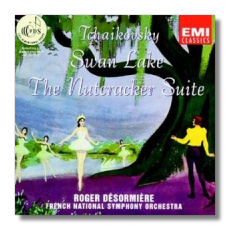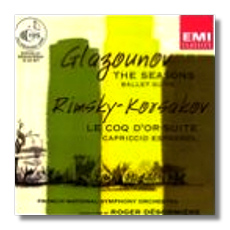
The Internet's Premier Classical Music Source
Related Links
- Latest Reviews
- More Reviews
-
By Composer
-
Collections
DVD & Blu-ray
Books
Concert Reviews
Articles/Interviews
Software
Audio
Search Amazon
Recommended Links
Site News
 CD Review
CD Review
Roger Désormière Conducts

Piotr Ilyitch Tchaikovsky
- The Nutcracker Suite
- Swan Lake Excerpts
French National Symphony Orchestra/Roger Désormière
EMI Classics 66828 ADD monaural 68:43


- Nikolai Rimsky-Korsakoff:
- Le Coq d'or Suite
- Capriccio espagñole
- Alexander Glazunov: The Seasons
French National Symphony Orchestra/Roger Désormière
EMI Classics 66829 ADD monaural 73:42
These recordings, made for Capitol Classics between 1951 and 1954, were among the last of Maestro Désormière. Although he died in 1963, he spent the last 13 years of his life battling aphasia. Conductors have overcome many physical and emotional disabilities. Loss of speech, however, probably puts a conductor out of the running!
The importance of these reissues is two-fold. First, it takes us back to the days when orchestras did not all sound the same. Granted, the FNSO is not an ensemble whose sound places it in the very first rank. Its timbre is typical of that era's French orchestras: nasal and dry. This might seem all wrong for the lush melodies of the Russian masters, but the result is a modesty that definitely speaks more of the ballet theater than of the concert hall. And well it should – and this is the second item to note – Désormière made his early career as a ballet conductor. In the 1920s, he was on the staff of the Ballets Suedois and Diaghilev's Ballets Russes, and later, he was responsible for a number of notable French premières. Contemporary composers such as Messiaen and Poulenc thanked him for his sincere advocacy.
His 1949 Pelléas et Mélisande is his most important recording; it still is available on a few different labels. The present discs display his clear-headed and objective conducting – no exaggeration, no faults of taste, no ego, no desire to impress for impression's sake. For this reason, it is refreshing to hear his Tchaikovsky (particularly), his Rimsky-Korsakov, and his Glazunov. (The Seasons remains one of my favorite scores. This is how I got interested in classical music in the first place.) Although these are monaural recordings, they rest easily on the ears, except for the Glazunov, which suffered from irreperable distortion on the master tape.
Copyright © 1999, Raymond Tuttle


















